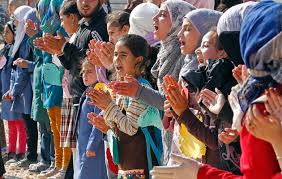 UNITED NATIONS: India is home to nearly one in three unregistered children worldwide, with 71 million children under the age of five not having their births recorded, a UNICEF report has said.
UNITED NATIONS: India is home to nearly one in three unregistered children worldwide, with 71 million children under the age of five not having their births recorded, a UNICEF report has said.
The UN agency said globally the births of nearly 230 million children under five have never been recorded, with Asia being the home to more than half of these children (59 per cent).
Another 37 per cent live in sub-Saharan Africa and the remaining four per cent are from other regions.
In 2012 alone, 57 million infants, four out of every ten babies delivered worldwide that year, were not registered with civil authorities.
“Birth registration is more than just a right. It is how societies first recognize and acknowledge a child’s identity and existence,” Geeta Rao Gupta, UNICEF Deputy Executive Director, said at a news conference here yesterday.
“Birth registration is also key to guaranteeing that children are not forgotten, denied their rights or hidden from the progress of their nations,” Gupta said.
The new report, ‘Every Child’s Birth Right: Inequities and trends in birth registration’, collects statistical analysis spanning 161 countries and presents the latest available country data and estimates on birth registration.
Among the 10 countries with the largest numbers of unregistered children, India has 71 million, the most, followed by Nigeria at 17 million.
“Nearly one in three unregistered children live in India,” UNICEF said, adding that the lowest levels of birth registration in India are found among children from the two largest population groups – Hindus and Muslims.
Children from religious minorities, such as the Sikhs and Jains, are about twice as likely to be registered.
The 10 countries with the lowest birth registration levels are: Somalia (3 per cent), Liberia (4 per cent), Ethiopia (7 per cent), Zambia (14 per cent), Chad (16 per cent), Tanzania (16 per cent), Yemen (17 per cent), Guinea-Bissau (24 per cent), Pakistan (27 per cent) and Democratic Republic of the Congo (28 per cent).
Gupta said while India’s birth registration level was 41 per cent nationwide, there was a huge gap between states with the highest rates and those with the lowest, due mainly to accessibility and infrastructure issues. The education level of a mother has consistently been shown to influence the health and well being of her family.
Mothers with some schooling are more likely to know how to register a child than their uneducated peers, she said.
Likewise for India, birth registration levels increase with a mother’s education. Children unregistered at birth or without identification documents are often excluded from accessing education, health care and social security.
Reuniting children separated from their families during natural disasters, conflicts or as a result of exploitation is made more difficult by the lack of official documentation.
“Birth registration and a birth certificate is vital for unlocking a child’s full potential,” Gupta said.
“All children are born with enormous potential. But if societies fail to count them, and don’t even recognize that they are there, they are more vulnerable to neglect and abuse.
Inevitably, their potential will be severely diminished,” she said.
The percentage of registered children is above 90 per cent in all industrialized countries and among some countries in Central and Eastern Europe, the Commonwealth of Independent States (CEE/CIS) and Latin America and the Caribbean.
UNICEF said even when children are registered, many have no proof of registration.
Globally, one in seven registered children does not possess a birth certificate. In some countries, this is due to prohibitive fees, while in others, birth certificates are not issued and no proof of registration is available to families.
According to UNICEF, unregistered births are a symptom of inequities and disparities in a society.
The children most affected by these inequities include children from certain ethnic or religious groups, children living in rural or remote areas, children from poor households or children of uneducated mothers.
Programs need to address the reasons that families do not register children, including prohibitive fees, unawareness of the relevant laws or processes, cultural barriers, and the fear of further discrimination or marginalization.
UNICEF is using innovative approaches to support governments and communities in strengthening their civil and birth registration systems, Gupta said.–PTI





